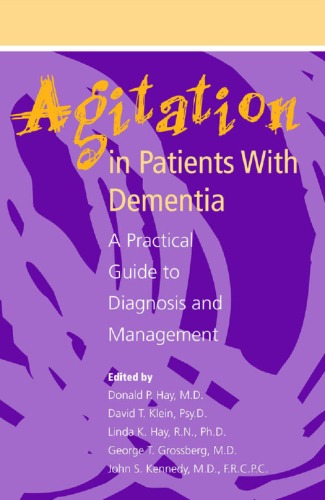(Ebook) Agitation in Patients with Dementia: A Practical Guide to Diagnosis and Management by Donald P. Hay, David T. Klein, Linda K. Hay, George T. Grossberg, John S. Kennedy ISBN 9780880488433, 9781585627387, 0880488433, 1585627380
Among the most frustrating challenges for any health care professional are treating and alleviating the distress of an agitated patient with dementiaAespecially compelling in the midst of todayAs unprecedented population explosion among adults over age 65. For the first time ever, people age 85 and older represent the fastest-growing segment of our population. As we find ways to meet this challenge, we are also transforming how we think about aging. Instead of the pejorative term Asenility,A which implies that simply to be old is to be infirm, we refer to the ABCs of geriatric psychiatry: disturbances in (A)ffect, (B)ehavior, and (C)ognition, which are not normal at any age. This remarkable monograph offers practical direction on assessing and managing agitation in patients with dementia. Furthermore, this encouraging work shows that successful outcomesAwith response rates as high as 70%Acan be achieved with a systemic approach, involving both patient and caregiver, that includes cognitive, behavioral, psychodynamic, and reminiscence therapies. This concise book identifies and diagnoses the multiple types of agitation in dementia patients. It also explains how to look for and treat the underlying medical etiologies, and recommends treatment and management techniques, including: -Definitional and theoretical conceptualizations of agitation in the elderly; the epidemiology (i.e., the possible relationships involving agitation and dementia, and the dynamic between symptoms and the care setting) and neurochemistry (i.e., the neurobiological changes of behavior involve biochemical and structural causes, not structural causes alone) of agitation -Behavior assessment scales as evaluation tools; differential diagnoses (distinguishing delirium, depression, psychosis, and anxiety from the many precipitating and maintaining factors underlying agitation); clinical assessment and management of agitation in residential and other settings (extremely difficult and frustrating, often leading to staff and caregiver burnout) -Nonpharmacological interventions, such as a systemic approach to psychotherapy for both patient and caregiver (with some response rates as high as 70%), bright light therapy (promising but unproven), electroconvulsive therapy (effectiveAwith minimal and temporary side effectsAfor severe, treatment-intolerant, or treatment-resistant illness), and hormone replacement therapies -The pathophysiology, pharmacology, and clinical data of serotonergic agents, mood stabilizers, neuroleptics, beta blockers, benzodiazepines, and other miscellaneous agents -The legal and ethical issues in treating agitation in patients with dementiaAfinding the balance between autonomy and beneficence in the treatment of an agitated patient with dementia is difficult at best, with the challenge being to allow the patientAs participation as long and as fully as possible This book will appeal to a wide audience of geriatric psychiatrists, primary care physicians and internists, general practitioners, nurses, social workers, psychologists, pharmacists, and mental health care workers and practitioners.
*Free conversion of into popular formats such as PDF, DOCX, DOC, AZW, EPUB, and MOBI after payment.


